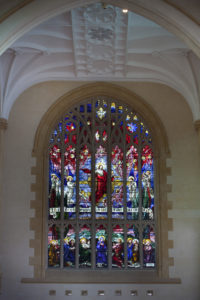Exult !!
19th April, 2020
In the darkness, there shines a light – a light which the darkness can never extinguish...exult, let them exult…
One of the features of the Easter Vigil is the beloved Exultet – that jewel of our Church’s treasury of music heard only once in a year – like a herald as we stand at the threshold of Easter.
This piece can be seen as almost belonging to a genre of which it is the sole occupant – a singular, unique piece in the entire repertoire of chant – a ‘one-of-a-kind’. And although it is indeed a masterpiece of great musical beauty, its melody carries profound truths that the one singing it is so fortunate to proclaim. It’s not just a pretty ‘melos’ – it has a great sense of gravitas as it speaks of eternal and ultimate truths.
Its beauty is, indeed, the perfect vehicle for the great truths it speaks of.
 Let’s consider some of its features: its very opening of three notes outlines a perfect 4th – an interval which, in itself, conveys a sense of strength and firm belief (Handel uses it as the opening interval of his aria ‘I know that my Redeemer liveth’). And before its first phrase is over, its endearing tune playfully weaves down an interval of a 3rd. Then almost immediately we hear a descending cascade of notes this time outlining a 7th – thus, with its vigorous movement and wide range creating, from its outset, an animated and joyful atmosphere.
Let’s consider some of its features: its very opening of three notes outlines a perfect 4th – an interval which, in itself, conveys a sense of strength and firm belief (Handel uses it as the opening interval of his aria ‘I know that my Redeemer liveth’). And before its first phrase is over, its endearing tune playfully weaves down an interval of a 3rd. Then almost immediately we hear a descending cascade of notes this time outlining a 7th – thus, with its vigorous movement and wide range creating, from its outset, an animated and joyful atmosphere.
Notice how these ‘cascades’ occur throughout the whole piece – the more prominent instances being on the words ‘this is the night’ – it draws our attention to what it is about this night with the text taking us back deep in into our history: ‘O truly necessary sin of Adam’…‘the night when once you lead our forebears…from slavery in Egypt’…’the pillar of fire’…’the night when Christ broke the prison bars of death’…this linking of ages past with Christ’s Resurrection echoes words we have heard only a few moments earlier in the Vigil: ‘Christ, yesterday and today; the Beginning and the End, the Alpha and the Omega’
Notice also the interval of a 5th which occurs towards the very beginning – it occurs three times then it’s not seen again. In a few notes it results in the encompassing of an interval of a 7th – but more interestingly, the text which this 5th carries in the original Latin is ‘tuba’ – trumpet – perhaps briefly bringing to mind a type of trumpet-call heralding the ‘King’s triumph’ it has just mentioned.
The text returns to the subject of light towards the end praying to the Father that ‘this candle,..may persevere undimmed to overcome the darkness of the night’ and refers to Jesus as the ‘Morning Star who never sets’…
May He, the ‘Morning Star that never sets’ truly be with us in this moment of darkness, confusion, pain and suffering…and may he ‘shed his peaceful light on humanity’…He, who ‘lives and reigns for ever and ever’.
Wishing everyone a happy and holy Easter season !!
Jacinta

